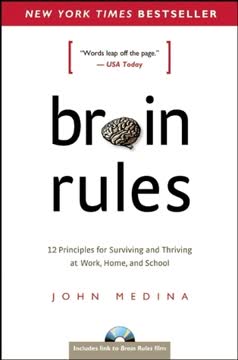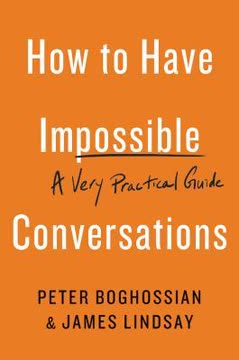Key Takeaways
1. Chronic stress changes brain structure and function
Chronic stress cripples your rational brain's ability to skillfully conduct its orchestra.
Brain rewiring: Chronic stress alters the brain's structure and connectivity, particularly affecting the prefrontal cortex (rational brain) and the amygdala (emotional brain). This rewiring leads to:
- Weakened control over emotions and behavior
- Increased emotional reactivity
- Impaired decision-making and problem-solving abilities
- Difficulty in regulating stress responses
Stress agents: Chronic stress activates seven "stress agents" that initially protect against acute stress but become harmful when persistently active:
- Poorly regulated emotional brain
- Abnormal cortisol levels
- Declined synaptic plasticity
- Malfunctioning body clock
- Chronic inflammation
- Insulin resistance
- Altered sense of motivation and reward
2. Emotional regulation is key to stress resilience
Never leave pleasure by the wayside or sacrifice it for "more important" things.
Strategies for regulation: Developing emotional regulation skills is crucial for managing stress. Key techniques include:
- Focused attention meditation: Improves control over thoughts and emotions
- Cognitive reappraisal: Reinterpreting stressful situations in a more positive light
- Distractions: Engaging in activities that require concentration, like puzzles or games
- Flow state: Immersing oneself in challenging yet enjoyable activities
Long-term benefits: Regular practice of emotional regulation techniques leads to:
- Increased resilience to stress
- Better control over negative emotions
- Improved mental health and well-being
- Enhanced cognitive performance under pressure
3. Control cortisol levels to manage stress response
When your brain triggers an acute stress reaction, it sets off one chain reaction after another until these eventually affect almost every system in the brain and body to bring on a change.
Cortisol management: Controlling cortisol, the primary stress hormone, is essential for stress resilience. Strategies include:
- Regular exercise, preferably in the morning
- Mindfulness and meditation practices
- Deep breathing exercises
- Maintaining a consistent sleep schedule
Quick recovery techniques: After a stressful event, employ these methods to lower cortisol quickly:
- Engage in light physical activity
- Practice deep breathing or progressive muscle relaxation
- Listen to calming music or nature sounds
- Use visualization techniques to imagine a peaceful setting
4. Foster growth in the rational brain for better stress management
Your prefrontal cortex and hippocampus are in a state of constant growth.
Promoting brain growth: Encourage growth in the rational brain (prefrontal cortex and hippocampus) through:
- Regular aerobic exercise
- Learning new skills or languages
- Engaging in mentally stimulating activities
- Practicing mindfulness and meditation
Nutritional support: Certain nutrients can support brain health and growth:
- Omega-3 fatty acids (found in fish oil)
- Turmeric (curcumin)
- Antioxidant-rich foods (berries, dark leafy greens)
- Vitamin D
5. Tune your body clock to improve stress resilience
Chronic stress can disturb your body's twenty-four-hour clock, and disrupt its circadian rhythm.
Circadian rhythm optimization: Maintain a healthy body clock by:
- Establishing consistent sleep and wake times
- Exposing yourself to natural light during the day
- Limiting blue light exposure in the evening
- Timing meals appropriately (earlier in the day)
Sleep hygiene: Improve sleep quality to enhance stress resilience:
- Create a relaxing bedtime routine
- Keep the bedroom cool, dark, and quiet
- Avoid caffeine and alcohol close to bedtime
- Limit screen time before sleep
6. Extinguish inflammation to reduce stress impact
Chronic stress dwarfs our lives rather than enabling us to thrive in our environment.
Anti-inflammatory lifestyle: Reduce chronic inflammation through:
- Adopting an anti-inflammatory diet rich in fruits, vegetables, and omega-3 fatty acids
- Regular exercise, particularly moderate-intensity activities
- Stress reduction techniques like meditation and yoga
- Adequate sleep and hydration
Gut health: Maintain a healthy gut microbiome to reduce inflammation:
- Consume probiotic-rich foods (yogurt, kefir, sauerkraut)
- Eat prebiotic fiber to feed beneficial gut bacteria
- Avoid excessive alcohol and processed foods
- Consider probiotic supplements if needed
7. Modulate insulin resistance for better stress handling
Insulin resistance often occurs hand in hand with central obesity (fat accumulation around the middle) and high blood pressure.
Insulin sensitivity: Improve insulin sensitivity to better manage stress:
- Engage in regular physical activity, including both aerobic and resistance training
- Adopt a diet low in refined carbohydrates and high in fiber
- Practice intermittent fasting or time-restricted eating
- Maintain a healthy body weight
Nutritional strategies: Specific foods and nutrients can help modulate insulin resistance:
- Consume foods rich in magnesium (nuts, seeds, leafy greens)
- Include cinnamon in your diet
- Eat fatty fish for omega-3 fatty acids
- Consider supplementing with chromium or alpha-lipoic acid under medical supervision
8. Master motivation to combat stress-induced anhedonia
Anhedonia results from a defect in the reward circuit.
Reward system activation: Combat anhedonia (loss of pleasure) by:
- Engaging in activities that provide a sense of accomplishment
- Setting and achieving small, manageable goals
- Practicing gratitude and savoring positive experiences
- Engaging in social activities and maintaining connections
Dopamine boosting: Natural ways to increase dopamine levels:
- Regular exercise, especially enjoyable forms like dancing
- Listening to music you love
- Spending time in nature
- Engaging in creative activities or hobbies
9. Align beliefs and goals for long-term stress resilience
Having a sense of purpose correlates with general good health.
Purpose and meaning: Develop a sense of purpose to enhance stress resilience:
- Identify and pursue long-term goals aligned with your values
- Engage in activities that contribute to something larger than yourself
- Cultivate a growth mindset to view challenges as opportunities
- Practice self-compassion and positive self-talk
Cognitive alignment: Reduce cognitive dissonance to minimize stress:
- Regularly reassess and align your actions with your beliefs and values
- Practice mindfulness to increase self-awareness
- Seek out experiences that challenge and expand your perspective
- Engage in regular self-reflection and journaling
Last updated:
FAQ
What's Stress-Proof about?
- Focus on Stress Management: Stress-Proof by Mithu Storoni delves into the neurobiology of stress, offering scientific solutions to protect the brain and body from its effects.
- Chronic Stress Effects: It discusses how chronic stress can lead to health issues like high blood pressure and mental disorders, emphasizing the need to understand stress to mitigate its impacts.
- Comprehensive Approach: The book presents a multifaceted approach to stress management, covering emotional regulation, cortisol control, and motivation to empower readers in managing their well-being.
Why should I read Stress-Proof?
- Evidence-Based Strategies: The book provides scientifically backed strategies for improving resilience and mental performance, with actionable advice for daily life.
- Expert Insights: Written by a medical doctor, it offers insights into the neurobiology of stress, making complex concepts accessible and credible.
- Practical Applications: Readers will find practical applications for managing stress in various life aspects, encouraging a proactive approach to mental health.
What are the key takeaways of Stress-Proof?
- Understanding Stress: Recognizing how stress affects the brain and body is crucial for managing responses effectively.
- Seven Routes to Resilience: The book outlines seven areas to target for stress resilience, including emotional regulation and cortisol management.
- Lifestyle Modifications: Emphasizes the role of diet, exercise, and sleep in managing stress, leading to significant well-being improvements.
How does Stress-Proof define stress?
- Biological Response: Stress is a biological response to perceived threats, causing changes in the brain and body, with chronic stress being particularly harmful.
- Set Point Theory: Introduces "set points," baseline levels of physiological parameters that stress can alter, leading to health issues if elevated.
- Psychosocial Stress: Modern stressors often stem from psychosocial interactions, requiring different management strategies than physical threats.
What strategies does Stress-Proof recommend for emotional regulation?
- Cognitive Reappraisal: Reinterpreting stressful situations in a less distressing light to reduce emotional reactivity.
- Attention Training: Activities requiring focused attention, like meditation, can strengthen emotional regulation and build resilience.
- Short-Term and Long-Term Fixes: Offers immediate strategies for managing emotions and long-term practices for overall emotional regulation.
How can I control cortisol levels according to Stress-Proof?
- Avoid Rumination: Dwelling on stress prolongs cortisol production; engaging in distracting activities can help mitigate this.
- Breathing Techniques: Controlled breathing, such as deep or paced breathing, can lower cortisol levels and promote relaxation.
- Regular Exercise: Moderate exercise helps regulate cortisol levels, but balance is key as excessive exercise can have the opposite effect.
What role does inflammation play in stress according to Stress-Proof?
- Inflammation and Stress Connection: Chronic stress increases inflammation, creating a cycle that exacerbates stress responses and health issues.
- Impact on Mental Health: Inflammation is linked to mental health disorders like depression, making its management crucial for stress management.
- Lifestyle Factors: Diet, exercise, and sleep are vital in controlling inflammation, helping mitigate chronic stress effects.
How does Stress-Proof suggest improving motivation?
- Aligning Goals and Beliefs: Aligning personal beliefs with long-term goals enhances motivation by fostering purpose and direction.
- Positive Reinforcement: Activities providing a sense of achievement boost motivation, with small wins maintaining momentum.
- Mindfulness Practices: Mindfulness techniques help focus on goals and reduce distractions, enhancing motivation through clarity and purpose.
What are the seven routes to becoming stress-proof as outlined in Stress-Proof?
- Improving Emotional Regulation: Techniques like cognitive reappraisal and attention training enhance emotional management.
- Getting Stress Hormones in Check: Regulating cortisol through lifestyle changes and stress management techniques is emphasized.
- Encouraging Healthy Activity in the Rational Brain: Activities stimulating cognitive function counter chronic stress effects.
- Tuning Up Your Body Clock: Strategies for optimizing sleep and daily routines maintain a regular circadian rhythm.
- Taming Chronic Inflammation: Addressing inflammation through diet and lifestyle changes mitigates stress effects.
- Fighting Insulin Resistance: Managing insulin levels through diet and activity prevents stress-related health issues.
- Boosting Motivation: Goal alignment and positive reinforcement are essential for resilience against stress.
What role does diet play in stress management according to Stress-Proof?
- Nutritional Impact: A balanced diet influences stress levels and mental health, with foods rich in vitamins and healthy fats recommended.
- Specific Foods: Incorporating fatty fish, nuts, and whole grains supports brain function and reduces inflammation.
- Avoiding Processed Foods: High amounts of processed foods and sugars exacerbate stress and inflammation, so focus on whole, nutrient-dense foods.
How does Stress-Proof address the relationship between stress and sleep?
- Sleep Disruption: Irregular sleeping patterns negatively impact insulin dynamics and health, emphasizing the need for regular sleep.
- Importance of Sleep Hygiene: Good sleep hygiene, with at least seven hours of sleep per night, is crucial for resilience and stress management.
- Timing of Sleep: Aligning sleep patterns with natural circadian rhythms enhances sleep quality and overall well-being.
What is the significance of the default mode network (DMN) in Stress-Proof?
- Brain Activity: The DMN is active during rest and self-referential thought, shaping our sense of self and memory.
- Impact on Stress: A negative bias in the DMN increases stress and anxiety, with positive engagement enhancing resilience.
- Long-term Goals: The DMN is linked to long-term goals and beliefs, with positive engagement improving mental health.
Review Summary
Stress-Proof receives mostly positive reviews, with readers praising its scientific approach and practical advice for managing stress. Many appreciate the wide range of strategies offered, from diet and exercise to mindfulness and social connections. Some find the book dense with information, while others note its accessibility. Critics mention that implementing all suggestions could be time-consuming and that some advice is common sense. Overall, readers value the book's insights into the mind-body connection and its potential to improve well-being.
Similar Books







Download PDF
Download EPUB
.epub digital book format is ideal for reading ebooks on phones, tablets, and e-readers.




